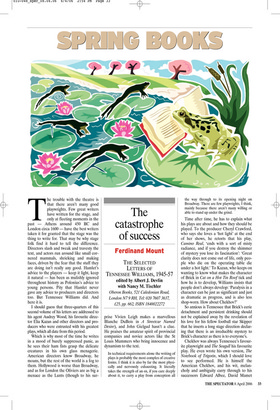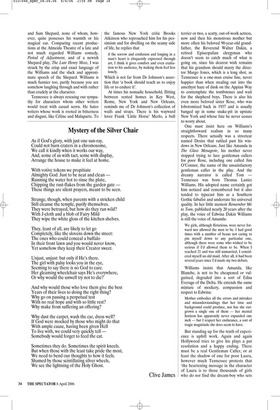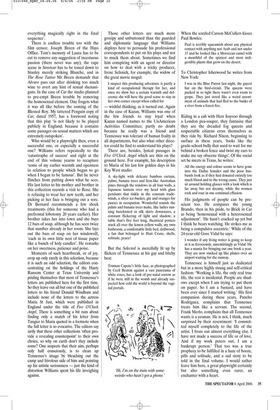The catastrophe of success
Ferdinand Mount
THE SELECTED LETTERS OF TENNESSEE WILLIAMS, 1945-57 edited by Albert J. Devlin with Nancy M. Tischler Oberon Books, 521 Caledonian Road, London N7 9 RH, Tel: 020 7607 3637, £25, pp. 662, ISBN 1840022272 The trouble with the theatre is that there aren’t many good playwrights. Few great writers have written for the stage, and only at fleeting moments in the past — Athens around 450 BC and London circa 1600 — have the best writers taken it for granted that the stage was the thing to write for. That may be why stage folk find it hard to tell the difference. Directors slash and tweak and travesty the text, and actors run around like small cornered mammals, shrieking and making faces, driven by the fear that the stuff they are doing isn’t really any good. Hamlet’s advice to the players — keep it light, keep it natural — has been as mulishly ignored throughout history as Polonius’s advice to young persons. Pity that Hamlet never gave any advice to producers and directors too. But Tennessee Williams did. And here it is.
I should guess that three-quarters of this second volume of his letters are addressed to his agent Audrey Wood, his favourite director Elia Kazan and other directors and producers who were entrusted with his greatest plays, which all date from this period.
Which is why most of the time he writes in a mood of barely suppressed panic, as he sees their ham fists grasp the delicate creatures in his own glass menagerie. American directors know Broadway, he moans, but the rest of the world is a fog to them. Hollywood is worse than Broadway, and as for London the Oliviers are as big a menace as the Lunts (though to his sur prise Vivien Leigh makes a marvellous Blanche DuBois in A Streetcar Named Desire), and John Gielgud hasn’t a clue. He praises the amateur spirit of provincial companies and novice actors like the St Louis Mummers who bring innocence and dynamism to the text.
In technical requirements alone the writing of plays is probably the most complex of creative forms. I think it is also by far the most physically and nervously exhausting. It literally takes the strength of an ox, if you care deeply about it, to carry a play from conception all the way through to its opening night on Broadway. There are few playwrights, I think, mainly because there aren’t many willing or able to stand up under the grind.
Time after time, he has to explain what his plays are about and how they should be played. To the producer Cheryl Crawford, who says she loves a ‘hot light’ at the end of her shows, he retorts that his play, Camino Real, ‘ends with a sort of misty radiance, and if you destroy the shimmer of mystery you lose its fascination’: ‘Great clarity does not come out of life, only people who die on the operating table die under a hot light.’ To Kazan, who keeps on wanting to know what makes the character of Brick in Cat on a Hot Tin Roof tick and how he is to develop, Williams insists that people don’t always develop: ‘Paralysis in a character can be just as significant and just as dramatic as progress, and is also less shop-worn. How about Chekhov?’ So anxious is Tennessee that Brick’s eerie detachment and persistent drinking should not be explained away by the revelation of his love for his fellow football star Skipper that he inserts a long stage direction declaring that there is an irreducible mystery to Brick’s character as there is to everyone’s.
Chekhov was always Tennessee’s favourite playwright and The Seagull his favourite play. He even wrote his own version, The Notebook of Trigorin, which I should love to see performed. He is himself the American Chekhov, and his wit, melancholy and ambiguity carry through to his successors Edward Albee, David Mamet and Sam Shepard, none of whom, however, quite possesses his warmth or his magical ear. Comparing recent productions at the Almeida Theatre of a late and not much regarded Williams comedy, Period of Adjustment, and of a newish Shepard play, The Late Henry Moss, I was struck by the crisp and exact language of the Williams and the slack and approximate speech of the Shepard. Williams is much funnier too, partly because you are somehow laughing through and with rather than crudely at the character.
Tennessee is always rescuing our sympathy for characters whom other writers would treat with casual scorn. He hates writers whose work is rooted in bitterness and disgust, like Céline and Malaparte. To the famous New York critic Brooks Atkinson who reproached him for his pessimism and for dwelling on the seamy side of life, he replies that
if the sorrow and confusion and longing in a man’s heart is eloquently expressed through art, I think it gives comfort and even exaltation to his audience, by making them feel less lonely.
Which is not far from Dr Johnson’s assertion that ‘a book should teach us to enjoy life or to endure it’.
At times his nomadic household, flitting between rented homes in Key West, Rome, New York and New Orleans, reminds me of Dr Johnson’s collection of waifs and strays. There is his wayward lover Frank ‘Little Horse’ Merlo, a bull terrier or two, a scatty, out-of-work actress, now and then his monstrous mother but more often his beloved 90-year-old grandfather, the Reverend Walter Dakin, a retired Episcopalian clergyman who doesn’t seem to catch much of what is going on, since his dearest wish remains that his grandson should marry the director Margo Jones, which is a long shot, as Tennessee is a one-man cruise line, never happier than when stealing out into the amethyst haze of dusk on the Appian Way to contemplate the tombstones and wait for the shepherd boys. There is also his even more beloved sister Rose, who was lobotomised back in 1937 and is usually banged up in some snake-pit in upstate New York and whose fate he never ceases to worry about.
One must insist here on Williams’s straightforward realism in so many respects. There actually was a streetcar named Desire that rattled past his windows in New Orleans. Just like Amanda in The Glass Menagerie, his mother never stopped trying to lure gentleman callers for poor Rose, including one called Jim O’Connor, the name of the unsatisfactory gentleman caller in the play. And the dreamy narrator is called Tom Tennessee was born Thomas Lanier Williams. His adopted name certainly got him noticed and remembered but it also tended to typecast him as a Southern Gothic fabulist and underrate his universal quality. In her little memoir Remember Me to Tom, published nearly 20 years after the play, the voice of Edwina Dakin Williams is still the voice of Amanda:
We girls, although flirtatious, were never forward nor allowed the men to be. I had good times with a number of beaus not caring to pin myself down to any particular one, although there were some who wished to be serious if I’d allowed them to be. When I reached 21 and was still unmarried, I considered myself an old maid. After all, it had been several years since I’d made my two debuts.
Williams insists that Amanda, like Blanche, is not to be cheapened or vulgarised, degraded into a sort of Edna Everage of the Delta. He extends the same mixture of mockery, compassion and respect to Edwina:
Mother embodies all the errors and mistakes and misunderstandings that her time and background could produce, nor has she outgrown a single one of them — her mental horizon has apparently never expanded one inch — but I respect her endurance, a sort of tragic magnitude she does seem to have.
But standing up for the truth of experience is uphill work. Again and again Hollywood tries to give his plays a pat resolution and a happy ending. There must be a real Gentleman Caller, or at least the shadow of one for poor Laura, however much Tennessee protests that ‘the heartening message in the character of Laura is to those thousands of girls who do not find the dream-boy who sets everything magically right in the final sequence’.
There is endless trouble too with the film censor, Joseph Breen of the Hays Office. Tom’s memory of Laura has to be cut to remove any suggestion of incestuous passion (there never was any), the rape scene in Streetcar has to be toned down to Stanley merely striking Blanche, and in The Rose Tattoo Mr Breen demands that Alvaro pass out after drinking too much wine to avert any hint of sexual shenanigans. In the case of Cat the studio planned to pre-empt Breen trouble by removing the homosexual element. One forgets what it was all like before the coming of the Blessed Roy. My tattered Penguin copy of Cat, dated 1957, has a foreword noting that this play ‘is not likely to be played publicly in England, because it contains some passages on sexual matters which are extremely outspoken’.
Who would be a playwright then, even a successful one, or especially a successful one? Williams refers repeatedly to the ‘catastrophe of success’ and right at the end of this volume yearns to recapture ‘some of my earlier warmth and openness in relation to people which began to go when I began to be famous’. But he never flinches from putting down what he sees. His last letter to his mother and brother in this collection records a visit to Rose. She is refusing to wear her new teeth, and her picking at her face is bringing out a sore. Dr Bernard recommends a few shock treatments (this for someone who had a prefrontal lobotomy 20 years earlier). Her brother takes her into town and she buys 12 bars of soap, although he has seen twice that number already in her room. She lays out the bars of soap on her windowsill, ‘each in its own little nest of tissue paper like a bunch of holy candles’. He remarks on her sweetness, patience and poise.
Moments of such heartbreak, or of joy, crop up only rarely in this selection, because it is such an odd selection, the editors concentrating on the holdings of the Harry Ransom Center at Texas University and priding themselves that most of Tennessee’s letters are published here for the first time. So they leave out all but one of the published letters to his friend Donald Windham and include none of the letters to the actress Maria St Just, which were published in England under the title of Five O’Clock Angel. There is something a bit rum about finding only a snatch of his letter from Tangier to Maria quoted in a footnote when the full letter is so evocative. The editors say airily that these other collections ‘often provide a revealing counterpoint’ to their own choice, so why on earth don’t they include some? One suspects that their aim, perhaps only half consciously, is to clean up Tennessee’s image by bleaching out the camp and frivolous side of him and pointing up his artistic seriousness — just the kind of distortion Williams spent his life inveighing against. Those other letters are much more gossipy and unbuttoned than the guarded and diplomatic language that Williams deploys here to persuade his professional correspondents to put on his plays and not to muck them about. Sometimes we find him conspiring with an agent or director on how to deal with a tricky producer, Irene Selznick, for example, the widow of the great movie mogul:
I suspect this producing adventure is partly a kind of occupational therapy for her, and once we show her a certain warmth and deference she will have the good sense to stay in her own corner except when called for
— wishful thinking, as it turned out. Again in the case of Kazan, Williams was one of the few friends to stay loyal when Kazan named names to the UnAmerican Activities Committee; partly no doubt because he really was a friend and Tennessee was tolerant of human frailty in all departments, but also what other director could he find to understand his plays?
There are, besides, lyrical passages in Five O’Clock Angel which are thin on the ground here. For example, his description to Maria of his last few golden days in his Key West studio:
A sky-light with delicate bamboo curtain, palms, banana trees and fern-like Australian pines through the windows in all four walls, a Japanese lantern over my head with glass pendants that tinkle in the constant tradewinds, a silver ice-bucket, gin and oranges for pauses in occupation. Wonderful sounds the palms and banana trees make, like ladies running barefooted in silk skirts downstairs, a constant flickering of light and shadow, a table that’s five feet long, theatrical posters stuck all over the lemon yellow walls, my own bathroom, a comfortable little bed, driftwood, a fan that belonged to Hart Crane, shells, solitude, peace!
But the Selected is mercifully lit up by flickers of Tennessee at his gay and bitchy best:
Truman Capote’s little face, as photographed by Cecil Beaton against a vast panorama of white roses, has a look of pre-natal sorrow as if he were still in the womb and already suspected how cold the world is beyond the vaginal portals.
When the sozzled Carson McCullers kisses Paul Bowles:
Paul is terribly squeamish about any physical contact with anything not Arab and not under 15 and he looked like a Moroccan camel with a mouthful of the spiniest and most indigestible plants that grow on the desert.
To Christopher Isherwood he writes from New York:
I was in the Blue Parrot last night, the gayest bar on the bird-circuit. The queens were packed in so tight there wasn’t even room to grope. They just stood like a weird assortment of animals that had fled to the banks of a river from a forest fire.
Riding in a cab with Herr Issyvoo through a London pea-souper, they fantasise that they are the dreaded fog queens and respectable citizens cross themselves as they ride by. Richard Nixon, beginning to surface in these years, ‘looks like the grade-school bully that used to wait for me behind a broken fence and twist my ears to make me say obscene things’. Of the social set he meets in Texas, he writes:
All the energy and colour seems to have gone into the Dallas females and the poor husbands look as if they had donated entirely too much blood and to the wrong cause. They just sit around holding glasses with a look which is far away but not dreamy, while the women rock and roar in one continual effusion.
His judgments of people can be prescient too. He compares the young Brando, then in his pride, to Brick in Cat as being ‘homosexual with a heterosexual adjustment’. ‘He hasn’t cracked up yet but I think he bears watching. He strikes me as being a compulsive eccentric.’ While of the 24-year-old Gore Vidal he says:
I wonder if any living writer is going to keep at it as ferociously, unremittingly as Vidal. He has a mania for bringing out one book a year. They are now stacked up like planes over an airport waiting for the runway.
Tennessee is himself just as dedicated but in a more highly strung and self-critical fashion: ‘Working is life, the only real true life, the rest is incidental. People are shadows except when I am trying to put them on paper. So I am a bastard, and have been ever since I started writing.’ His first companion during these years, Pancho Rodriguez, complains that Tennessee treats him like a servant. The second, Frank Merlo, complains that all Tennessee wants is a yesman. He is not, I think, much surprised by their resentment: ‘I committed myself completely to the life of the artist. I froze out almost everything else. I have not made a success of life or of love. And if my work peters out, I am a bankrupt person.’ That too was a true prophecy to be fulfilled in a haze of booze, pills and solitude, and a sad story to be told in the final volume. I would rather leave him here, a great playwright certainly but also something even rarer, an enchanter with a heart.












































































 Previous page
Previous page